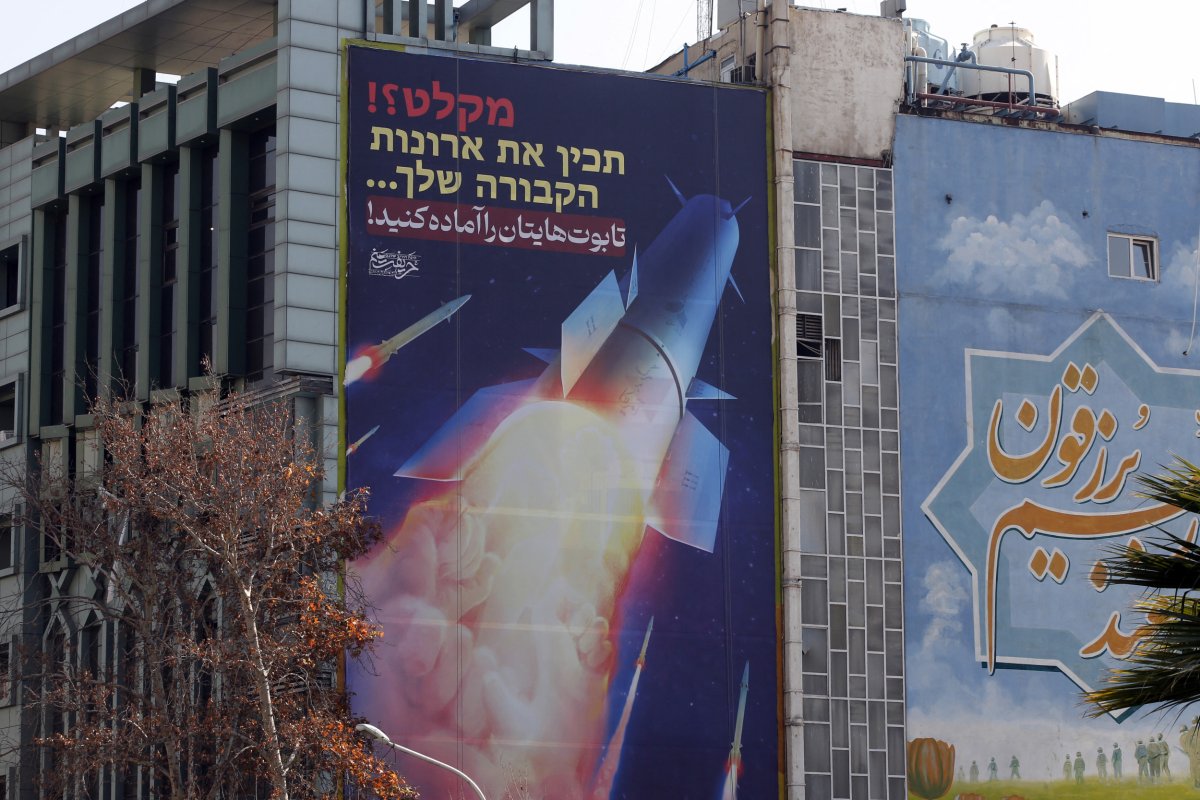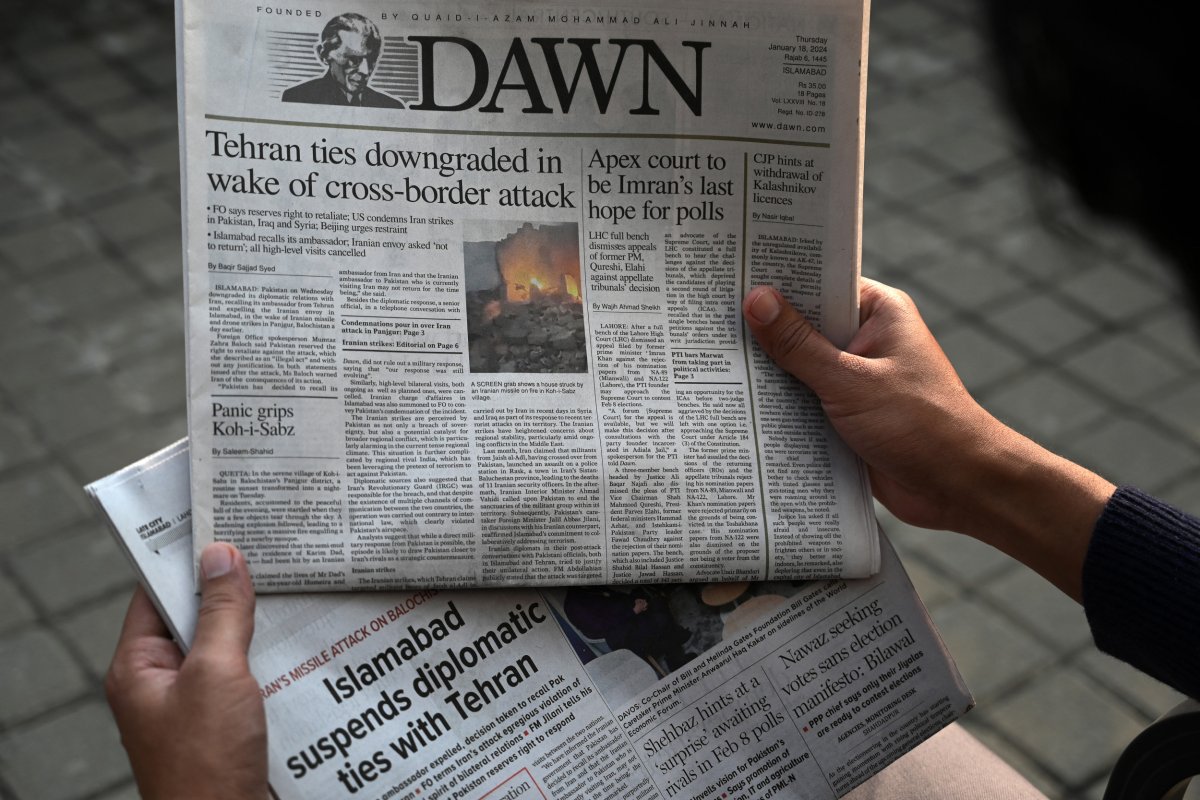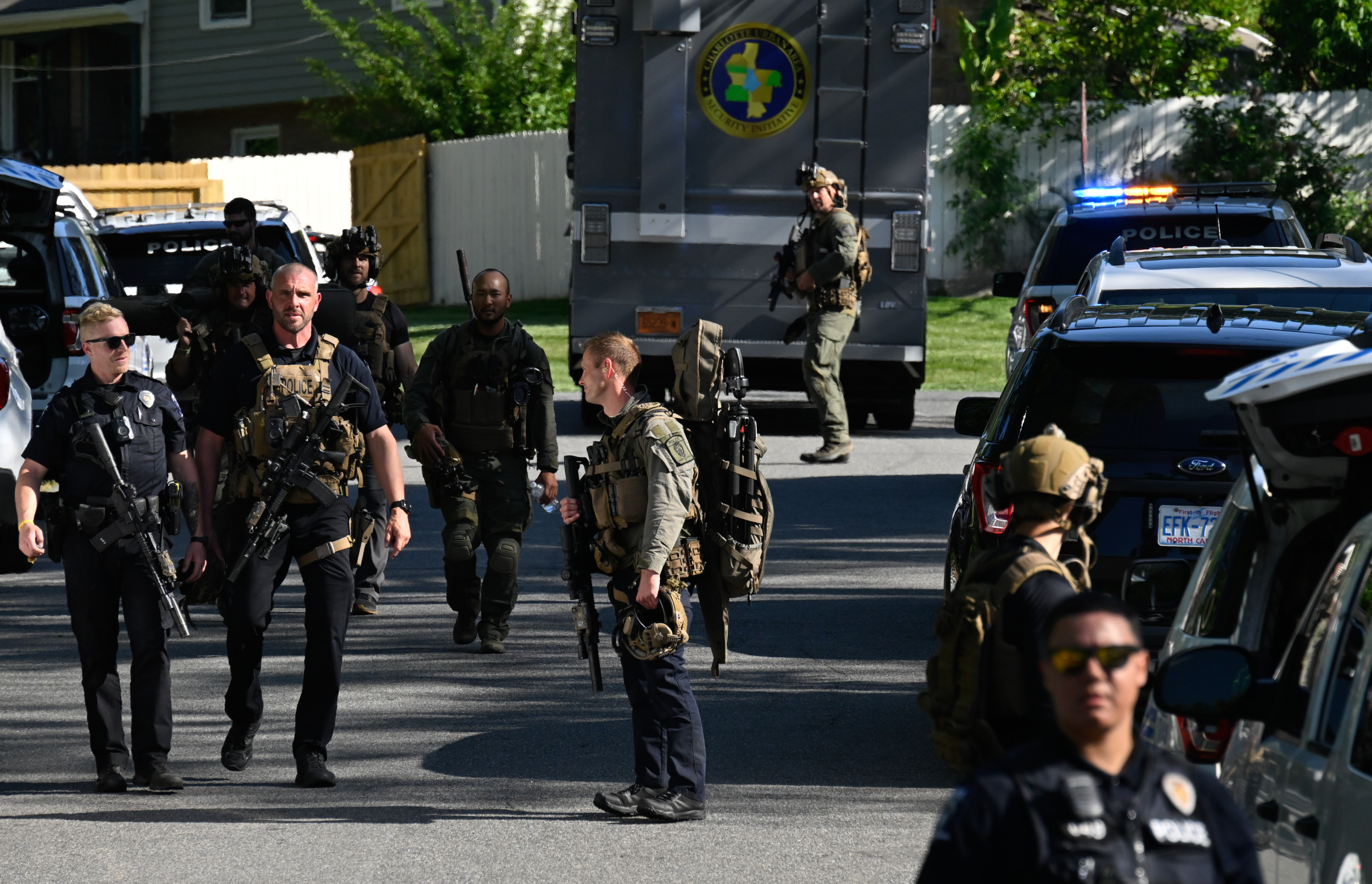Iran's brazen missile attack on alleged militant group positions in neighboring Pakistan on Tuesday marked an explosive new development in growing unrest that has gripped the Middle East since the outbreak of the deadliest-ever war in Gaza and is now spreading east toward an already volatile geopolitical situation in South Asia.
Expressing outrage over what it deemed to be a violation of its national territory targeting civilians, Pakistan fired back on Thursday against what it said were rebel-held sites in Iranian territory, setting the stage for potential further escalation in brewing tensions between two "brotherly" Islamic republics, one of which possesses nuclear weapons.
Mediation processes have already been scrambled, especially by China, which has positive relations with both nations. But what comes next for Iran and Pakistan as they navigate this unprecedented clash on the sidelines of other pressing crises?
"That's the million-dollar question," Arif Rafiq, president of New York-based Middle East and South Asian political and security consulting firm Vizier Consulting, told Newsweek. "Neither country seeks to fight an inter-state war on their shared frontier. They face threats of a greater strategic magnitude from elsewhere."
"So, both Iran and Pakistan have a clear interest in finding a ceiling for this mini-conflict and a pathway toward de-escalation," he added. "The question is how."
The answer lies in how both countries address their primary motivation for their respective attacks: mounting domestic pressure to assert themselves in the face of a series of growing security woes at home.

For Iran, this includes the killing of Islamic Revolutionary Guard Corps (IRGC) Quds Force Brigadier General Sayyed Razi Mousavi in an airstrike widely attributed to Israel outside of Damascus in Syria in late December, the deaths of military personnel in a police station attack claimed that same month by Sunni militant group Jaish al-Adl near the border with Pakistan and the Islamic State group-claimed attack in Kerman earlier this month that marked the nation's deadliest militant attack since the Islamic republic was formed in 1979.
"The fans of the Islamic Republic of Iran had called for a strong response to these actions by holding various gatherings and also on social networks," Javad Heirannia, director of Persian Gulf Studies at the Center for Scientific Research and Middle East Strategic Studies in Tehran, told Newsweek.
The second major objective of the missile strikes conducted against sites in Iraq, Syria and Pakistan was aimed abroad, he argued.
"Another message of these attacks to America and Israel was that Iran will take deterrent measures commensurate with the threats," Heirannia said. "On the other hand, Tehran sends this message to countries like Iraq, Pakistan and Afghanistan that it will not allow threats against Iran from their soil."
Mostafa Najafi, a Tehran-based analyst specializing in Middle East conflicts, also outlined what he saw as Iran's primary objectives in the missile strikes against Iraq, Syria and Pakistan.
These include "fighting terrorism and weakening terrorist groups around its borders, removing threats and stabilizing its defense capabilities and sending a message to regional and international enemies such as the United States and Israel that it will respond aggressively to any threat."
"A distinction should be made between Iran's recent attacks on terrorist positions in Iraq, Syria and Pakistan, and the attacks carried out by the Axis of Resistance against American or Israeli positions in the region," Najafi said.
"Iran's recent aggressive campaign in Iraq, Syria and Pakistan should be directly related to the recent terrorist attacks on Iranian soil," he added. "Attacks that created a great challenge for Iran's national security in a tense regional environment."
But the extent to which such operations, explosive as they may be, may actually address Iran's growing security concerns remains uncertain. Heirannia, for his part, suggested that the potential for significant blowback is high, especially given Pakistan's own considerable military prowess and strategic position in the region.
"Pakistan is a country with a nuclear bomb and has a long-standing enmity with India," Heirannia said. "Any deterrent message from Pakistan to Iran's attacks can be an indication for India of Islamabad's reaction. Iran does not have influence in Pakistan like [it does in] Iraq."
"In addition, the army and some [others] ruling Pakistan, including the current government, do not sympathize with Iran," he added.
In fact, India was among the few nations that broadcast support for Iran's attack, signaling a connection with New Delhi's longstanding accusations that Islamabad harbored militant groups, accusation Pakistani officials have vehemently denied as the two nuclear-armed South Asian nations remain locked in a standoff over the disputed Kashmir region.
The Iranian strike in Pakistan also happened to take place as Indian External Affairs Minister Subrahmanyam Jaishankar was in Tehran. The visit, as Heirrania explained, signaled progress on resolving issues related to join interest in developing the Chabahar port, a key node in the North-South Corridor that he said rivals Pakistan's Gwadar port, a central hub of the China-Pakistan Economic Corridor and international Beijing-led Belt and Road Initiative.
These underlying elements have only flared Pakistan's indignation over the Iranian attack and fueled the retaliatory strikes, which were said to have struck positions of the separatist Baluchistan Liberation Army (BLA) and Baluchistan Liberation Front (BLF) in Iran's southeastern province of Sistan and Baluchistan, which borders both Pakistan and Afghanistan. Jaish al-Adl, the BLA and the BLF are separate factions waging a larger insurgency to establish an independent state in the broader Baluchistan region that encompasses parts of Iran, Pakistan and Afghanistan.
In addition to internal and external security concerns, Pakistan is also mired in mounting frustration over repeatedly delayed elections at a time when former Prime Minister Imran Khan, head of the country's most popular party, is behind bars for a slew of charges.
"Of course, with elections coming up, the atmosphere in Pakistan is very charged at the moment," Arhama Siddiqa, a research fellow at the Institue of Strategic Studies Islamabad, told Newsweek, "so yes, it was pressure to showcase credible deterrence in response to this totally uncalled for act by Iran."
And "domestic pressures as may be" for Tehran as well, she argued, "the Iranian strike was a severe breach of Pakistan's sovereignty."
"This action by Iran has exacerbated the ongoing complexities in the broader Middle East, achieving an undesirable outcome that every country in the region had sought to avoid: a regional escalation," she said.
"This development now poses a severe risk of entangling all neighboring countries of Iran, a scenario that the global community and, specifically, the region simply cannot afford," she added. "The situation has effectively pushed towards an escalation, contrary to the collective interest/desire in maintaining stability."
Still, Siddiqa asserted that "Iran and Pakistan do not want further escalation and will now try to resolve this through as diplomatic means as possible."
Iran and Pakistan's mutual desire to stamp out insurgency across their restive border has proven a point of cooperation for the two nations, though this dynamic has been plagued over the years by dueling accusations of failing to live up to commitments.
Still, "barring some fissures," according to Syed Ali Zia Jaffery, deputy director of the Lahore-based Center for Security, Strategic and Policy Research, "Pakistan-Iran relations have been cordial and steady."
"This is one of the reasons why this two-sided use of force is being dubbed brazen," he told Newsweek.
Jaffery said that Pakistan's "swift kinetic response" to the Iranian strikes has "made its red lines absolutely clear," being "indicative of the fact that Iran's use of force will be destabilizing."
"In other words, if Iran decides to undertake such risky actions against Pakistan going forward, it won't be able to achieve anything," he said. "If anything, it will be faced with a formidable military challenge on its eastern border. Therefore, it is important for Iran to ensure that domestic voices, if any, that call for taking on Pakistan are sidelined."
"As for Pakistan, there will be little support to ramp things up with Iran, especially because the country has other crises to navigate," he added. "That being said, no matter what, the pressure to retaliate to any act of aggression will always be a factor that will govern Pakistan's response mix going forward."

But there are other factors at play beyond either nation's control, most notably the decision by Beijing to intervene diplomatically in a bid to smooth out the rising tensions. China, having successfully brokered a landmark deal in March 2023 to reestablish diplomatic relations between rivals Iran and Saudi Arabia, has even greater interest in avoiding further conflict near its own borders.
With concerns over Uighur separatism in the Xinjiang region reignited by the Taliban's takeover of Afghanistan, Chinese officials have ramped efforts to instill in the region—especially among members of the Shanghai Cooperation Organization, which includes both Iran and Pakistan—the immediate need to confront "the three evils" of terrorism, separatism and extremism.
Should a larger Iran-Pakistan conflict erupt, not only will it "set a dangerous precedent" with the potential for further cross-border attacks, but "counterterrorism issues will be wrongly conflated with those of sovereignty," according to Jaffery.
"A major conflict between the two countries will be bad news for regional connectivity and integration," he said. "Consequently, extremism and militancy will likely increase in the region, much to the detriment of all."
This destabilizing scenario is one of the primary reasons that China is stepping up its mediation efforts amid looming threats issued against the People's Republic by the Islamic State group's Afghanistan-based Khorasan branch (ISIS-K).
"If Iran and Pakistan are forced to mobilize forces toward their border, groups like ISIS-K can exploit the void," Arif Rafiq, the Vizier Consulting firm president, said. "The ISIS-K attack in Kerman reflects the ability of this group to target the Afghanistan-Iran-Pakistan triangle and Chinese interests in the region, leveraging the porous borders."
"If Iranian and Pakistani security forces are compelled to direct their focus elsewhere, that could give ISIS-K the space to do more damage and sow more chaos," he added.
But such an outcome is far from inevitable given attempts by Iran and Pakistan to squarely frame their actions as counterterrorism efforts, and their mutual desire to avoid any path toward a broader conflict. Given the trajectory of the recent events, what comes next could be largely determined as to whether or not Iran seeks to respond to the Pakistani attack, and how domestic pressures there develop.
"Pakistan's military response today is sufficient for its domestic audience," Arif said. "So the ball is in Iran's court right now. Does Iran feel compelled to respond to Pakistan's retaliation? Or is having targeted Jaish al-Adl extraterritorially in this first set of attacks sufficient?"
Najafi, the Tehran-based Middle East analyst, asserted that it was up to both Iran and Pakistan to manage their relationship moving forward.
"Although these attacks create a new challenge for Iran in the neighborhood environment, my assessment is that it can provide the necessary ground for more serious cooperation between Iran and its neighbors to deal with common threats," Najafi told Newsweek.
"However, it should be kept in mind that the management of neighborhood relations is two-sided and not one-sided," he added. "Neighbors should also understand Iran's security concerns in its surrounding environment and have the necessary cooperation."
Newsweek has reached out to the Iranian Embassy in Islamabad, the Pakistani Foreign Ministry, the Taliban-led Afghan Foreign Ministry and the media office of Jaish al-Adl for comment.
Update: 1/18/2023, 9:40 a.m ET. This article has been updated to include additional expert comment.
Uncommon Knowledge
Newsweek is committed to challenging conventional wisdom and finding connections in the search for common ground.
Newsweek is committed to challenging conventional wisdom and finding connections in the search for common ground.
About the writer
Based in his hometown of Staten Island, New York City, Tom O'Connor is an award-winning Senior Writer of Foreign Policy ... Read more
To read how Newsweek uses AI as a newsroom tool, Click here.








